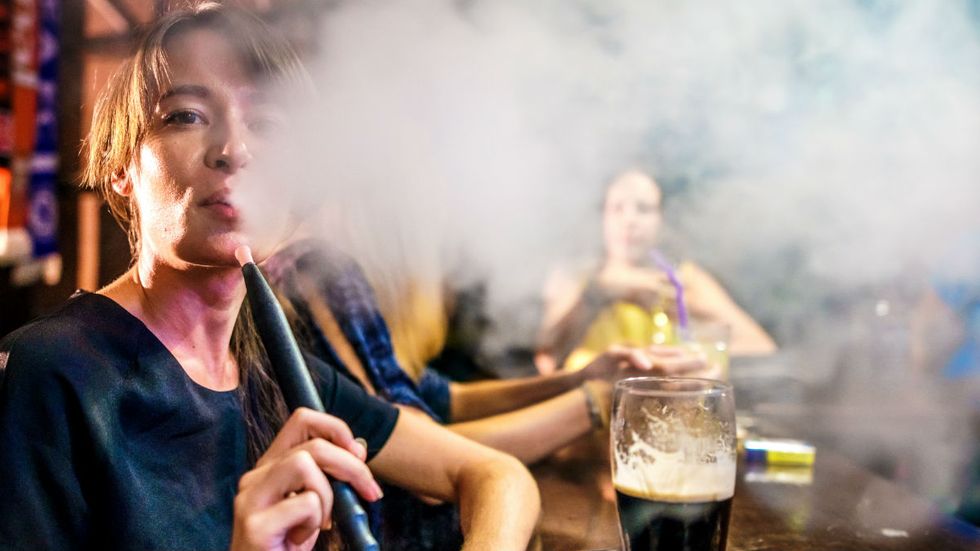
© 2025 Blaze Media LLC. All rights reserved.
The states of Michigan, New York, Massachusetts, and Rhode Island have enacted bans of e-cigarettes or vaping liquids in reaction to reported deaths linked to vaping. The president has expressed a concern and shared a plan for an FDA ban on e-cigarette flavors.
Officials believe a surge in teen use is the result of the flavoring of the vaping liquids that can deliver large doses of nicotine with fruity, minty, or candy flavors. Considering meticulous studies in the 1990s in which cigarette companies were accused of marketing to children, many have decided that government should act on alarming evidence that e-cigarette companies might be doing the nation’s youth similar harm.
Though the flavoring is the subject of the bans, the CDC reports that 26 people have died this year from illnesses linked to vapes. While that doesn’t get close to the supposed 480,000 people the CDC says die every year from cigarette smoking, the fact is that traditional cigarette smoking is down and vaping is on the rise.
But most deaths are not solely linked to nicotine, but to certain THC-delivering vapes, mostly bought through non-traditional channels.
However, the CDC cautions that it doesn’t yet know the cause of the illness outbreak and that the only commonality is that patients use vapes. According to the Washington Post:
One particular oil is a key focus of investigators: vitamin E oil, also known as vitamin E acetate. Experts in the legal marijuana industry have said it has been used on the marijuana black market to stretch THC oil that is used to fill vape cartridges. It is colorless and odorless, has similar viscosity to THC oil, and is much cheaper.Vitamin E acetate, which is sold legally, is commonly used as a nutritional supplement and in skin-care products. It’s not harmful when ingested or applied to the skin. But health officials have warned it could be hazardous when inhaled, potentially causing the sorts of symptoms many patients have reported: cough, shortness of breath and chest pain.
But what does that have to do with vaping nicotine?
If investigators are zeroing in on black-market THC oil mixed with vitamin E oil, why the crackdown on all flavored vapes? Why don’t government officials just caution against using vape liquid that contains THC? The FDA has in fact
And will a government ban on fruity and candy flavors really curb the appeal to youth now hooked on nicotine?
If the government is concerned that fruity flavorings and a perception that vaping is safer than smoking cigarettes is causing youth to become addicted to nicotine, it ought to ban the hookah, which became wildly popular for teenagers just before the e-cigarette craze hit the market. Hookah tobacco comes in fruity flavors just like vaping liquid flavors. Hookahs, the American Heart Association says, deliver more toxicity than cigarettes, with cases of carbon monoxide poisoning also reported. However, hookahs are assumed to be less harmful than cigarettes because the smoke passes through water before it enters the lungs.
But the CDC reports that in some ways, hookahs can be more dangerous than cigarettes. If smoking cigarettes is known to kill, shouldn’t we ban the hookah?
And before banning vapes, shouldn’t we ban cigarettes?
What is government’s role in all of this?
The political hype surrounding e-cigarettes is, as all political hype goes, always missing the point. Certain government officials have successfully taken a small number of deaths not necessarily linked to nicotine vapes and used it to ban flavored juices to try to curb what they see as an epidemic of nicotine addiction among the nation’s youth.
In the end, isn’t it the nicotine that keeps people coming back for more? Isn’t nicotine, a natural component of tobacco, the highly addictive chemical that is at the heart of the danger present in inhaling toxic fumes into our lungs? But instead of addressing the actual issues surrounding vapes, cigarettes, and other tobacco smoking or even smokeless tobacco, government blowhards accuse companies of deceptive marketing practices and trying to appeal to kids.
The last time the government cracked down on supposed marketing of nicotine to children, it successfully shook down the tobacco industry for billions of dollars in what was called the Master Settlement Agreement of 1998, and states were flush with cash intended to be used for smoking cessation, but they are not being used for that. The CDC reports, “In fiscal year 2019, states will collect a record $27.3 billion from tobacco taxes and settlements in court, but will only spend $655 million in the same year. That’s less than 2.4% spent on programs that can stop young people from becoming smokers and help current smokers quit.”
In light of all this, a reasonable conclusion to all the hype is that government is looking to shake down another nicotine-delivering industry.
#mc_embed_signup{background:#fff; clear:left; font:14px}
/* Add your own MailChimp form style overrides in your site stylesheet or in this style block.
We recommend moving this block and the preceding CSS link to the HEAD of your HTML file. */
Want to leave a tip?
We answer to you. Help keep our content free of advertisers and big tech censorship by leaving a tip today.
Want to join the conversation?
Already a subscriber?
more stories
Sign up for the Blaze newsletter
By signing up, you agree to our Privacy Policy and Terms of Use, and agree to receive content that may sometimes include advertisements. You may opt out at any time.
© 2025 Blaze Media LLC. All rights reserved.
Get the stories that matter most delivered directly to your inbox.
By signing up, you agree to our Privacy Policy and Terms of Use, and agree to receive content that may sometimes include advertisements. You may opt out at any time.


